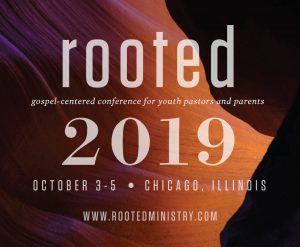When I first began to drive, finding destinations required a map. As in a fold-out map.
 It wasn’t uncommon, when using one that hadn’t been updated to include new roads, to take a wrong turn and have to pull over, look at the map again, and adjust the route. There was none of this Google-Maps-automatically-adjusting-directions-to-help-me-find-the-best-way-out. It was a slow processs, and compared to today it all seems so archaic.
It wasn’t uncommon, when using one that hadn’t been updated to include new roads, to take a wrong turn and have to pull over, look at the map again, and adjust the route. There was none of this Google-Maps-automatically-adjusting-directions-to-help-me-find-the-best-way-out. It was a slow processs, and compared to today it all seems so archaic.
And this reaction—it all seems so archaic—is the response I sometimes have to the term “gospel-centered youth ministry.” When I analyze what I’m doing and how I’m doing it, I can wonder whether this really is the way God has called his people to minister to others.
It just seems so slow.
What other work spends its time proclaiming a divine man born through a virgin girl who grows up to be executed on a Roman cross? What other work involves you in teaching from thousands-of-years-old writings? What other work encourages people to speak this message to others and serve them without expecting anything in return? What other work provides solid hope, deep assurance, and new identity for those who believe?
When I think about gospel-centered youth ministry this way, I resonate with Paul: The message of the cross is foolishness. For those of us who believe it’s also the power of God to save (1 Cor. 1:18; Rom. 1:16), however, we press on in the work.
The gospel ought to be at the heart of youth ministry for at least five reasons.
1. It drives students to Jesus.
The heart of the Christian faith is the gospel—the gracious message of what God has done for us in Jesus. As Ephesians 2:8 reminds us, “For it is by grace you have been saved, through faith—and this not from yourselves, it is a gift of God.” He’s displayed his love for us through the gift of his Son, and through Christ’s death and resurrection we now live in light of that grace.
The heart of gospel-centered youth ministry is seeking to display this grace to students. In everything we do, despite our imperfections, we’re driving our students toward Jesus. We seek to point to him, show him, reveal him, trust him, and obey him so that our students will be “transformed into his image with ever-increasing glory” (2 Cor. 3:18).
2. It provides eternal perspective.
In our rapidly changing world, and with growing pressure on students, we’re often focused solely on the now. As we tell the story of Jesus, though, we place ourselves in a story that is thousands of years old. The grace we proclaim is carrying on what began long ago. In doing so, it helps our students gain an eternal perspective, a long-term view—one that helps them understand their place in the world and in God’s story.
Just think of this famous Bible verse: “For God so loved the world that he gave his one and only Son, that whoever believes in him shall not perish but have eternal life” (John 3:16).
Here we find a gospel nugget that gives an eternal perspective. There is the truth of God’s love, the gift of his Son, the call to believe, and the insistence that life is everlasting. The momentary life that we and our students inhabit is part of God’s larger story, leading us to understand there is something and someone greater than us.
3. It teaches God’s Word.
Second Timothy 3:16 reminds us, “All Scripture is God-breathed and is useful for teaching, rebuking, correcting and training in righteousness.” From Genesis to Revelation, the Bible is useful for all things in life and faith. Of course, we need to grow in our understanding of it, but God has ordained his Word as the way he speaks to us.
Therefore, a faithful youth ministry must take the Bible seriously. Through teaching and applying the Scriptures, we acknowledge that truth comes from God and not from us. Our worldview and our understanding of who we are, where we fit, and what our purpose is comes from outside ourselves. It comes through the revelation of God.
4. It encourages mission and service.
We are often inspired (and moved to action) by something we read, watch, or hear—whether it’s about our health and fitness, our ministry, or our spending habits. The gospel inspires us to help others understand the things of God. We are inspired to share the good news, and we seek to love others by serving them, and we look for opportunities to help and care for them.
We do this because it reflects the good news. Gospel-centered youth ministry is part of God’s mission in the world.
5. It provides hope, assurance, and an understanding of identity.
Our ultimate goal of youth ministry is to see students come to know God through Christ and to grow in likeness to him. This is God’s call for all of us. And for students and the world they live in, there is a constant need for hope, assurance, and a sense of belonging and purpose.
When bullying starts at school, when online overexposure occurs, when the pressure of friends to comply becomes too much, when the addictive nature of devices affects health, when the view of the body is distorted—students tend to lose hope. But when there’s assurance of who we are in Christ, those circumstances can change profoundly. The gospel is a gift to us and a gift to pass on to our students.
Privilege of Playing a Part
I can’t help but reflect on the hundreds of teenagers I’ve been privileged to teach and shepherd through the years. Some have stuck with faith and the church. Others dropped off, never to be seen of again.
Without the gospel and an understanding of God’s guiding sovereign hand in this work, I wouldn’t have survived this long. Thankfully, the growing is God’s and the sustaining is God’s—and yet we have the privilege of being a small part of this work through a gospel-centered youth ministry.
Dodgeball and abstinence training just aren’t enough. There’s only one thing that has the potential to bring lasting change to students’ lives: the gospel of Jesus Christ. In Gospel-Centered Youth Ministry: A Practical Guide, edited by Cameron Cole and and Jon Nielson, a host of experienced youth workers lay out a vision for the gospel as the center of every facet of ministry to young people.
Involved in Women’s Ministry? Add This to Your Discipleship Tool Kit.
 We need one another. Yet we don’t always know how to develop deep relationships to help us grow in the Christian life. Younger believers benefit from the guidance and wisdom of more mature saints as their faith deepens. But too often, potential mentors lack clarity and training on how to engage in discipling those they can influence.
We need one another. Yet we don’t always know how to develop deep relationships to help us grow in the Christian life. Younger believers benefit from the guidance and wisdom of more mature saints as their faith deepens. But too often, potential mentors lack clarity and training on how to engage in discipling those they can influence.
Whether you’re longing to find a spiritual mentor or hoping to serve as a guide for someone else, we have a FREE resource to encourage and equip you. In Growing Together: Taking Mentoring Beyond Small Talk and Prayer Requests, Melissa Kruger, TGC’s vice president of discipleship programming, offers encouraging lessons to guide conversations that promote spiritual growth in both the mentee and mentor.





























